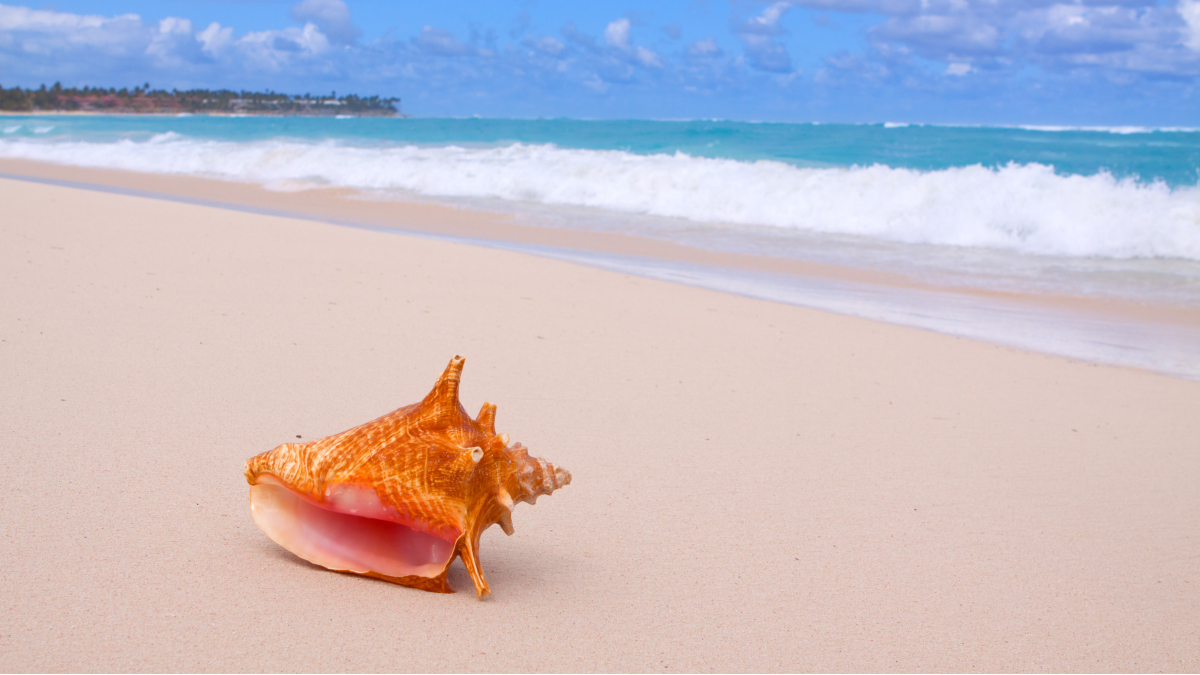The project is a point of convergence for conservation and sustainable use of marine resources, and a driver for a blue and green recovery from COVID-19.

Queen conch is an iconic product of the Caribbean and closely linked to culinary, cultural and tourism services. ©Swetlana Wall
The global market for queen conch (Strombus gigas) – a sea mollusc or shellfish used in and exported from the Caribbean – was estimated at $74 million in 2017 and continues to grow.
While its global demand is booming, small-scale coastal producers in the eastern Caribbean are not fully tapping the full breadth of opportunities offered by sustainable conch markets in particular.
A new project launched on 7 October by UNCTAD, the Organisation of Eastern Caribbean States (OECS) and the Convention on International Trade in Endangered Species of Wild Fauna and Flora (CITES) seeks to change their fortunes.
The 18-month initiative, funded by OECS with support from the European Union, aims at empowering small-scale coastal producers from the main queen conch producing nations in the eastern Caribbean – Grenada, Saint Lucia and St. Vincent and the Grenadines.
“This pilot project is a seed on fertile water that brings renewed hope for vulnerable populations in the region,” UNCTAD Deputy Secretary-General Isabelle Durant said while launching the project.
Ms. Durant said the project is unique as it would be a point of convergence for conservation and sustainable use of marine resources. It would power a “blue and green recovery” from COVID-19, she added.
The project aims to enhance the production of and trade in queen conch for domestic, regional and international markets using the BioTrade Principles and Criteria – a set of social, economic and environmental sustainability criteria that have been implemented for over a decade in more than 60 countries.
It will also advance UNCTAD’s work on Blue BioTrade, an innovative approach to sustainable trade and investment in marine biological resources that embraces sustainability principles and criteria.
Blue BioTrade offers opportunities for sustainable development through the value chain. The approach intends to develop planet-friendly livelihoods and foster adaptation to dynamic markets and changing ecological conditions.
Highly valued species
Queen conch is a highly appreciated seafood delicacy with important non-food uses, including therapeutic products, jewellery and handicrafts. It’s an iconic product of the Caribbean and closely linked to culinary, cultural and tourism services.
In 2015 alone, 1,400 tons of queen conch were exported from the Caribbean to the United States, representing about 70% of global conch trade.
The production of queen conch by Grenada, Saint Lucia and St. Vincent and the Grenadines was pegged at 645 metric tons with a value of about $7.6 million in 2012.
Prime Minister of Dominica and current chair of the OECS, Roosevelt Skerrit, warned that queen conch may become threatened unless harvesting is assessed and monitored, and trade closely controlled.
“This project is just the beginning of a process,” Prime Minister Skerrit said, adding that future trade flows must build on compliance with multilateral, regional and national legal requirements.
“We must ensure that we can add value to the existing commercialization of queen conch products and derivatives under BioTrade Principles and Criteria,” he said.
CITES Secretary-General Ivonne Higuero said that, in the wake of mounting and global concerns about people’s relationship with nature, the project would “promote long-term sustainability of the use of and trade in queen conch, and the well-being of local communities that rely on fisheries for their livelihoods.”
In many locations, early uncontrolled harvesting of queen conch has resulted in overfishing, illegal landings and a rapid deterioration of endowments. This is why it has been listed in CITES Appendix II since 1992.
The appendix includes species that are not necessarily threatened with extinction, but for which international trade must be controlled to avoid utilization incompatible with their survival.
Key supply-side concerns in the queen conch value chain include the absence of traceability systems and limited landing and trade data.
Equally of concern is the limited understanding and use of CITES requirements and processes, such as the issuing of trade permits, as well as the lack of common handling practices and sanitary standards, and the low level of associativity of fishers.
Seizing opportunities together
UNCTAD, OECS and CITES have joined forces to map and prioritize these concerns by conducting participatory value chain assessments of queen conch products in the three beneficiary countries.
OECS Director-General Didacus Jules said the partners will also develop a regional plan of action to tackle challenges and seize opportunities arising from the sustainable trade of queen conch products.
Mr. Jules said the project would enhance stakeholders’ capacity to identify sustainable and gender-inclusive business opportunities and formulate actions to pilot the application of the BioTrade Principles and Criteria to the queen conch value chain.
This will ensure small-scale coastal producers within and outside the beneficiary countries benefit from enhanced sustainable production and trade opportunities.
The partners also hope to expand the scope of the project to cover other OECS members and other species such as sea moss and sargassum in a next phase.
The project will directly contribute to achieving key targets of Sustainable Development Goal (SDG) 14 on conservation and sustainable use of oceans, seas and marine resources, and SDG 12 on ensuring sustainable consumption and production patterns.


